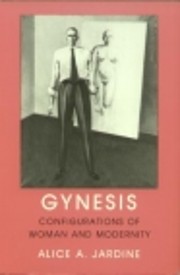

Click on a thumbnail to go to Google Books.
|
Loading... Gynesis: Configurations of Woman and Modernityby Alice A. Jardine
 None No current Talk conversations about this book. No reviews no reviews | add a review
Jardine's command of French theory is awesome. Even more impressive is the fact that she manages to delve into the subject without ever losing sight of certain impertinent American questions. "-Jane Gallop, Department of French and Italian, Miami University Gynesis: from the Greek-gyn- signifying woman, and -sis designating process. In her book, Alice Jardine charts the territories and landscapes of contemporary French thought, focusing on such concepts as "woman" and "the feminine," and relating them to the problem of modernity. Interdisciplinary in her approach, she confronts and addresses important psychoanalytic, philosophical, and fictional texts that are largely the work of male writers.In Part One Jardine charts the general boundaries of what she describes as the "problematization" of woman, and in Part Two she explores three major topologies of contemporary French thought-the breakdown of the Cartesian Subject, the default of Representation, and the demise of Man's Truth. Part Three analyzes the work of Jacques Lacan, Jacques Derrida, and Gilles Deleuze, three major French thinkers who, according to Jardine, are deeply involved in the process of gynesis, and discusses their readings of such writers as Marguerite Duras, Maurice Blanchot, and Michel Tournier. A final section turns to the question of comparativism by discussing male American and French writers-those self-consciously exploring the conceptual territories mapped in Part Two. Looking at her texts from the vantage point of an American feminist, Jardine voices the hope that feminism and modernity will not become mutually exclusive and, by the same token, that feminism will not grow less concerned with the question of female stereotyping.A brilliant and engaging book that will undoubtedly provoke controversy, Gynesis should find a large audience among students of contemporary thought-including feminists, literary and cultural critics, and philosophers. No library descriptions found. |
Current DiscussionsNone
 Google Books — Loading... Google Books — Loading...GenresMelvil Decimal System (DDC)305.4Social sciences Social Sciences; Sociology and anthropology Groups of people WomenLC ClassificationRatingAverage: (3.67) (3.67)
Is this you?Become a LibraryThing Author. |
||||||||||||||||||||||||||||||||||||||||||||||||||||||||||||||||||||||||||||||||||||||||||||||||||||||||||||||||||||||||